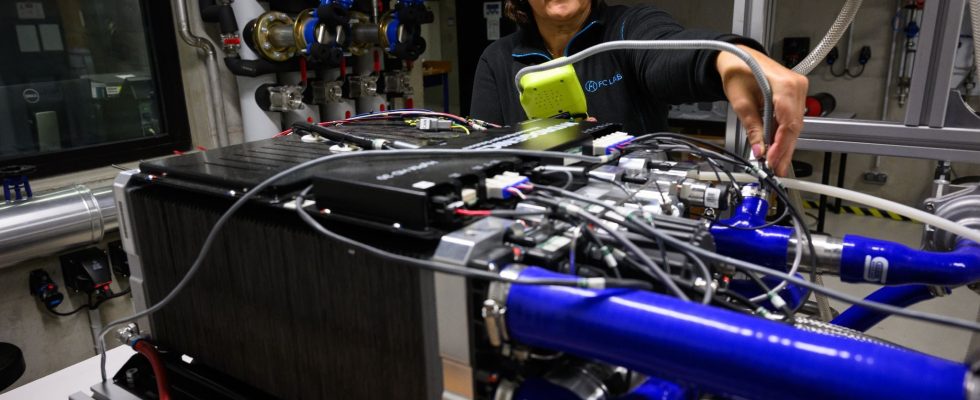In the mid-2010s, Toyota wanted to explore a new world with its Mirai sedan with an evocative name – it means “future” in Japanese. A world in which cars run on hydrogen. Equipped with a fuel cell, these electric vehicles emit only water vapor and can be recharged in as much time as it takes to fill up with gasoline. Less than a decade later, these ambitions seem to have crashed into the market wall. At the Tokyo motor show a few days ago, one of the Japanese manufacturer’s spokespersons admitted the failure of this first hydrogen car. “We tried the Mirai, without success,” said Hiroki Nakajima, Toyota’s technical director, to the British magazine Coach.
Without giving up a technology of which it is still one of the most fervent defenders, the Japanese giant says it wants to concentrate its efforts on utility vehicles. Before Toyota, a hydrogen specialist had bitten the dust. The French company Hopium was placed in receivership after failing to produce a single one of its luxury models. On the demand side, the metropolis of Montpellier has given up on purchasing hydrogen buses in 2022, while across the Rhine, Lower Saxony is abandoning trains equipped with fuel cells for cost reasons. Announcements that sow doubt. Has the time for hydrogen in mobility already come?
In the suburbs of Lyon, the leaders of Symbio dismiss the hypothesis out of hand. Owned by Michelin, Forvia and Stellantis, the young company continues to ramp up. In 2026, it plans to produce 50,000 fuel cell systems per year, in order to equip utility vehicles as a priority. “Volumes are significant in this segment, which allows costs to be lowered. Fuel cells are suitable for vehicles intended for professionals because the required performance is not sufficiently met by the battery: they must be equipped with high autonomy, and allow rapid recharging, without reduction of payload”, explains Christophe Schramm. In the eyes of Symbio’s vice-president in charge of marketing and strategy, the future is clear: “Fuel cell and battery electric vehicles are complementary. It will be like gasoline and diesel.”
At the head of France Hydrogène, the structure which brings together members of the sector, Valérie Bouillon-Delporte shares this diagnosis. “15 to 30% of uses cannot be covered by batteries in the utility sector, hence the interest in hydrogen,” explains the first vice-president of the association. The technology also makes sense in the case of trucks and buses used over long distances.” In the eyes of this emblematic figure of the sector in France, transport also appears as a means for producers of this precious gas – in its carbon-free version, of course – “to de-risk their investments by moving towards uses available in the short term” .
Hydrogen and mobility therefore seem to be a perfect couple. But there are still many clouds of uncertainty in the sky of their relationship. At the top of the list is the subject of hydrogen supply. To truly decarbonize transport, you might as well rely on decarbonized hydrogen: this must therefore be produced by electrolysis of water using electricity from renewable sources – at least with nuclear power. However, this production is very energy intensive, which should make it a rare and expensive resource. Especially since the transport of hydrogen remains a challenge. Hence the interest in allocating it to sectors whose decarbonization cannot be achieved without its help. This is the case for chemistry, already a large consumer of “gray” hydrogen – from fossil fuels – and steel. It could also be useful for maritime and air transport, since it is used in the production of ammonia and synthetic fuels.
Another sticking point in the case of land transport: the efficiency of a fuel cell remains far below the performance of batteries, whose autonomy and recharge time are also improving very quickly. “When we calculate the energy losses in vehicles, we see that for a battery model, they are of the order of 5% when recharging. Despite the additional losses under the hood, we arrive at an efficiency of 77%. For hydrogen, electrolysis represents 22% of energy losses, to which are added those linked to the conversion of hydrogen into electricity in the fuel cell. The efficiency of such a vehicle n “only reaches 30%”, calculates Diane Strauss. And the director of the French office of the NGO Transport & Environment (T&E) concluded that the electrification of land transport must be prioritized through batteries. Not sure that this will delight supporters of hydrogen.
